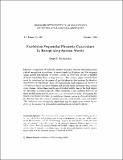| dc.description.abstract | Machine recognition of spoken language requires developing more robust recognition algorithms. The current paper extends the work of Shipman and Zue by investigating the power of partial phonetic descriptions. First we demonstrate that sequences of manner of articulation classes are more reliable and provide more constraint than other classes. Alone these are of limited utility, due to the high degree of variability in natural speech. This variability is not uniform, however, as most modifications and deletions occur in unstressed syllables. The stressed syllables provide substantially more constraint. This indicates that recognition algorithms can be made more robust by exploiting the manner of articulation information in stressed syllables. | en_US |

